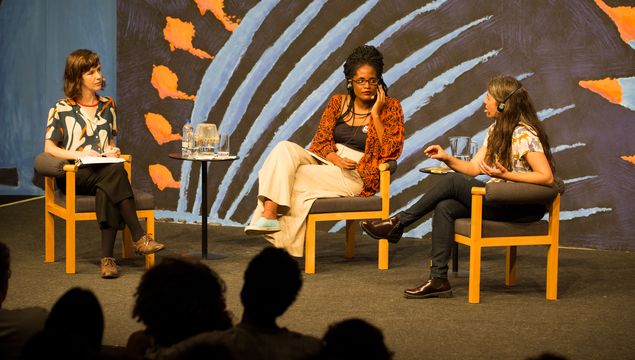Latest Photo Galleries
Brazilian Markets
12h03 Bovespa |
-0,14% | 129.028 |
16h43 Gold |
0,00% | 117 |
12h17 Dollar |
+0,39% | 5,0873 |
16h30 Euro |
+0,49% | 2,65250 |
ADVERTISING
Feminist Platforms Abound on the Second Day of the Paraty International Literary Festival
07/27/2018 - 13h04
Advertising
FERNANDA MENA
PATRÍCIA CAMPOS MELLO
The literary discussions that took place on the main stage of the Paraty International Literary Festival (Flip) were transformed into a platform for feminists on Thursday (the 26th): day two of the festival held in the town of Paraty.
The encounter between Argentine writer Selva Almada and philosopher Djamila Ribeiro, an exponent of the black feminist movement in Brazil, primarily revolved around the plurality and the nuances within the feminist movement on one hand, and feminicide and racism that target black women in particular on the other.
Ms. Ribeiro - the author of "Quem Tem Medo do Feminismo Negro" (or "Who's Afraid of Black Feminism?"), published by Companhia das Letras - spoke of the difficulty she had in identifying and understanding a feeling of not belonging: a sensation that haunted her for most of her life.
"Deconstructing what I had been taught about being black was a long, painful and difficult process. It took me a while to accept myself for who I was, to take off the mask of colonialism. When I started to have contact with black feminist writings, I discovered that, rather than being shy, I had been silenced."
| Marcus Leoni / Folhapress, ILUSTRADA | ||
 |
||
| Djamilla Ribeiro and Selva Almada at the the Paraty International Literary Festival (Flip) |
At the previous table, "Barco com Asas" (or "Boat with Wings"), the celebrated Portuguese poet Maria Teresa Horta, 81, was featured on a screen in order to participate in the event. She got a round of applause after describing her involvement with the feminist struggle in Portugal.
Maria Teresa said that she faced hostility after writing "New Portuguese Letters" in 1972: a manifesto against the fascist dictatorship. The book was censored and considered "pornographic". According to the poet, back in the day, some people would go up to her and tell her that she should be ashamed of herself for having written the book.
Translated by THOMAS MATHEWSON



